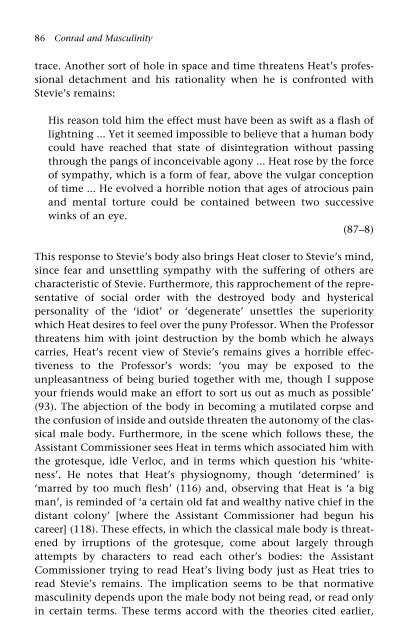Conrad and Masculinity
Conrad and Masculinity
Conrad and Masculinity
Create successful ePaper yourself
Turn your PDF publications into a flip-book with our unique Google optimized e-Paper software.
86 <strong>Conrad</strong> <strong>and</strong> <strong>Masculinity</strong><br />
trace. Another sort of hole in space <strong>and</strong> time threatens Heat’s professional<br />
detachment <strong>and</strong> his rationality when he is confronted with<br />
Stevie’s remains:<br />
His reason told him the effect must have been as swift as a flash of<br />
lightning ... Yet it seemed impossible to believe that a human body<br />
could have reached that state of disintegration without passing<br />
through the pangs of inconceivable agony ... Heat rose by the force<br />
of sympathy, which is a form of fear, above the vulgar conception<br />
of time ... He evolved a horrible notion that ages of atrocious pain<br />
<strong>and</strong> mental torture could be contained between two successive<br />
winks of an eye.<br />
(87–8)<br />
This response to Stevie’s body also brings Heat closer to Stevie’s mind,<br />
since fear <strong>and</strong> unsettling sympathy with the suffering of others are<br />
characteristic of Stevie. Furthermore, this rapprochement of the representative<br />
of social order with the destroyed body <strong>and</strong> hysterical<br />
personality of the ‘idiot’ or ‘degenerate’ unsettles the superiority<br />
which Heat desires to feel over the puny Professor. When the Professor<br />
threatens him with joint destruction by the bomb which he always<br />
carries, Heat’s recent view of Stevie’s remains gives a horrible effectiveness<br />
to the Professor’s words: ‘you may be exposed to the<br />
unpleasantness of being buried together with me, though I suppose<br />
your friends would make an effort to sort us out as much as possible’<br />
(93). The abjection of the body in becoming a mutilated corpse <strong>and</strong><br />
the confusion of inside <strong>and</strong> outside threaten the autonomy of the classical<br />
male body. Furthermore, in the scene which follows these, the<br />
Assistant Commissioner sees Heat in terms which associated him with<br />
the grotesque, idle Verloc, <strong>and</strong> in terms which question his ‘whiteness’.<br />
He notes that Heat’s physiognomy, though ‘determined’ is<br />
‘marred by too much flesh’ (116) <strong>and</strong>, observing that Heat is ‘a big<br />
man’, is reminded of ‘a certain old fat <strong>and</strong> wealthy native chief in the<br />
distant colony’ [where the Assistant Commissioner had begun his<br />
career] (118). These effects, in which the classical male body is threatened<br />
by irruptions of the grotesque, come about largely through<br />
attempts by characters to read each other’s bodies: the Assistant<br />
Commissioner trying to read Heat’s living body just as Heat tries to<br />
read Stevie’s remains. The implication seems to be that normative<br />
masculinity depends upon the male body not being read, or read only<br />
in certain terms. These terms accord with the theories cited earlier,




